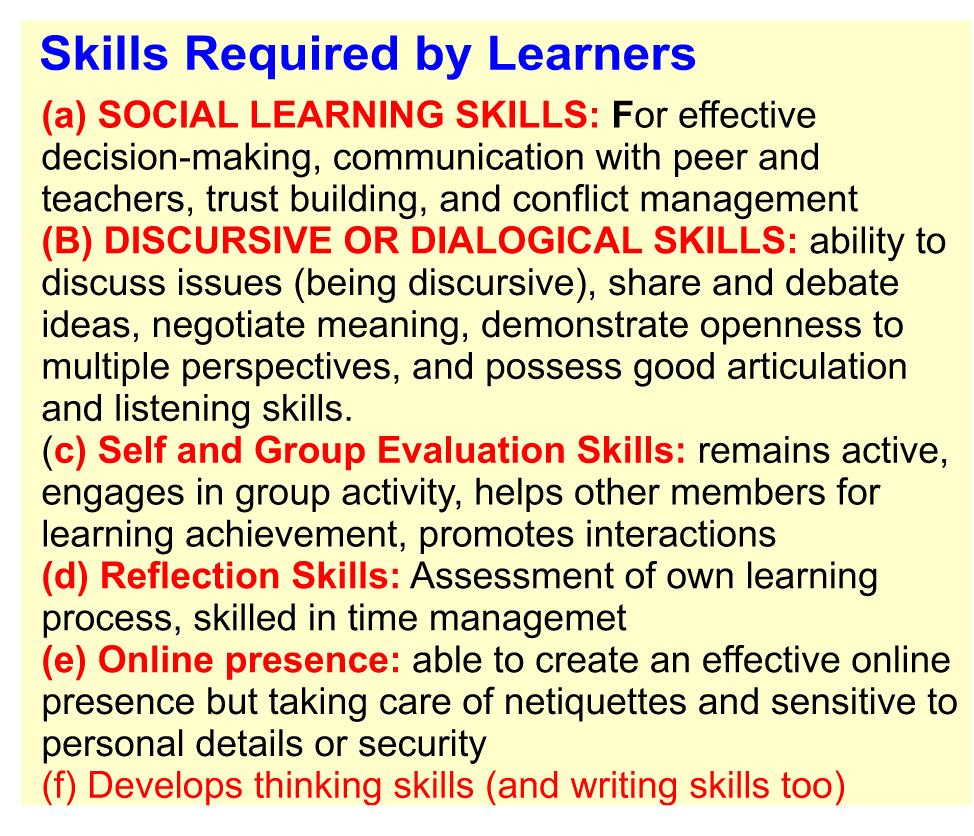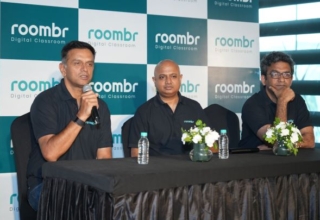
 India’s leading E–learning protagonist Prof MM Pant, who is also a disruptive education technology enthusiast, recently did a week-long course on MOOCs learning. The course taken by 145 educationists, educational professionals and scholars including from Sweden, UK, Bangladesh was perhaps first of its kind learning course using Whatsapp in India. The best outcome of this ‘disruptive’ and very useful course is a book on MOOCs.
India’s leading E–learning protagonist Prof MM Pant, who is also a disruptive education technology enthusiast, recently did a week-long course on MOOCs learning. The course taken by 145 educationists, educational professionals and scholars including from Sweden, UK, Bangladesh was perhaps first of its kind learning course using Whatsapp in India. The best outcome of this ‘disruptive’ and very useful course is a book on MOOCs.
The buzz around MOOCs is overwhelming. It is virtually raining MOOCs. Popular MOOCs platforms like edX, Coursera, Alison, etc have forced traditional higher education institutions to sit up and take plunge in devising their own. At least about 40% of HEIs in Europe are having MOOCs or planning to develop MOOCs soon. India is also working on its own MOOC platform, called as SWAYAM (Study Webs of Active-Learning for Young Aspiring Minds) and the government is giving it a big push to make it popular both among learners and course creators.
So, when everybody is talking about MOOCs, educationists and academicians are expected to lead in the design, development and delivery of the new age Massive Open Online Courses or MOOCs. And when they come together and express themselves safely and freely in company of their peers, their fears and apprehensions about MOOCs architecture and other technology nitigrities come to fore easily. However, having experts and like-minded cohort within the group makes up for this hesitation to a great extent as the discussions about various topics get interesting and enriching with knowledge. This is precisely what happened during ‘Learning with MOOCs’ course on Whatsapp by Prof Pant.
Well-known education technology consultant, Dr Ramesh C Sharma, was the main resource person for the course with Prof Madhulika Kaushik (professor at IGNOU), Prof Sanjay Jasola (VC, Graphic Era Hill University) and Prof K Srinivas (ICT Professor, NUEPA) providing additional inputs. The course included story of MOOCs, their taxonomy, learning opportunities with MOOCs, choosing an appropriate MOOC, how to benefit by sharing ideas and participating in discussions, strategies for effective time management and avoiding procrastination, role of MOOCs in 4th Industrial Revolution, meta-learning, role of parents and teachers in augmenting learning using MOOCs, learner skills set for learning with a MOOC, and trends in acceptability of MOOC credentials. From Moodle to Google apps, Flubaroo plugin to Schoology, the open education and technology resource was explored along with a number of most relevant articles, videos and other web resources during the chats.
According to Prof Pant one of the outcomes of this experiment was to be able to develop an effective system for implementing mobile life-long, learner centred education. “In the run up to succeed in the already arrived 4th Industrial Age there will be 3 new major ways of acquiring knowledge, and most learners ( young or not so young) today are ill equipped to benefit from them. These are: Learning with MOOCs, getting mentored and Social and peer learning,” he says while adding that he possibilities of billions of people connected by mobile devices, with unprecedented processing power, storage capacity, and access to knowledge, are unlimited. And these possibilities will be multiplied by emerging technology breakthroughs in fields such as artificial intelligence, robotics, the Internet of Things, autonomous vehicles, 3-D printing, nanotechnology, biotechnology, materials science, energy storage, and quantum computing.
Determining the size of whatsapp cohort and discussion over it was in itself a learning expedition for the group as the divergent and experiential views converged.
Another interesting and hot discussion centered on teachers not ready to embrace technology. “Most of our educators have no knowledge of even Blooms Taxonomy, heutagogy and andragogy are alien things. This is about schools and colleges both. This is not undermining us all, but accepting that we need to take up updating and learning. It is also necessary to enlighten end users namely students that the SMARTPHONE as a gadget has tremendous potential as a learning tool,” said one of the participants. “My major concern is that the teachers in schools create a pattern and habit of learning in the students life and that’s impossible to do if one himself/herself is not a lifelong learner. Have tried to do it with teachers and have touched success with many. However, the point i’m coming from is the need of a framework where it becomes a part of key responsibility areas of a teacher to become a lifelong learner. Moocs, or personalised & directed mobile learning, whichever be the platform, if we can create an interesting system for LLL of teachers, most of the students,I think, will follow,” opined another course participant.
According to Prof Mostafa Azad Kamal, director of the eLearning Center at Bangladesh Open University institutions should have a policy supporting technology based learning, required Infrastructure, and provisions for capacity building. If we can’t design our learning objectives clearly, don’t identify the relevant contents, do not use technology meaningfully, then the desired learning may not happen.” We are all after all shaping our young into an uncertain unknown future, prepare them to adapt, ideate, create, collaborate and build ethics ingrained in a deep value system. There should be a sense of urgency in preparing our youth for the future. Just watch a short Internet documentary ‘humans need not apply’, it is sure to give you sleepless nights. We are nearer to the scenario. 
So, the book “Learning with MOOCs” by Prof M M Pant and colleagues, which is expected to be completed by this month end, will be a great resource for Indian educators, majority of whom are afraid of learning technology.
(Please Note, a verbatim transcription of the chats/course is available with Curriculum magazine. Same can be shared on request. Mail at curriculum.mag@gmail.com)












